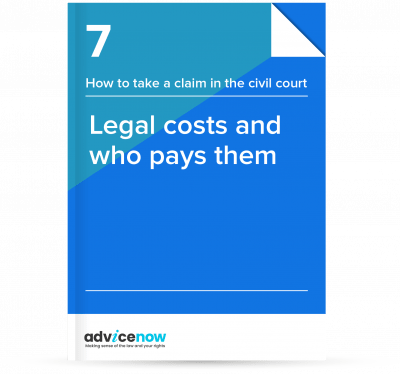
Choose section
- Introduction
- What are legal costs?
- Legal costs in small claims
- Legal costs for all fast track claims that started after 1st October 2023
- Legal costs for fast-track claims that started before 1st October 2023
- Legal costs for fast-track claims about personal injury where the injury was caused before 1st October 2023
- Expenses
- Top tips
- What does it mean?
- About this guide
Introduction
Top tip – Have a look at An overview of the process of taking a claim in the civil court to get an overview of what a typical case might look like and How to take a claim in the civil court - at a glance.
This guide is for you if you:
- are thinking about about taking someone to the small claims court or using the fast track at the county court either England or Wales, and
- your case involves a claim for £25,000 or less (claims for £10k to £25k are in the fast track and £10k or less are in the small claims court), and
- you are representing yourself (you are a litigant in person) and not eligible to have your case paid for by legal aid, a trade union, or insurance.
This guide is also for people supporting litigants in person, for example Support Through Court volunteers, Citizens Advice volunteers, housing support workers, advice workers and court staff, as well as relatives and friends.
If you have not yet read Should I sue someone? please do. It will help you assess whether it will really be worth your while to take legal action, and if you have what you need for your case to be successful.
This guide is not for you if you are involved in:
- a criminal case,
- a family case (such as an application for a domestic violence injunction or a divorce),
- a housing disrepair or housing possession case including mortgage possession,
- an injunction (including court claims about anti-social behaviour)
- a medical accident case,
- a case involving defamation (libel or slander) or
- a tribunal case (such as a discrimination or employment case).
Legal language
We try to explain any legal language as we go along, but there is also a ‘What does it mean?’ section at the end.
March 2024
What are legal costs?
Legal costs (often just referred to as ‘costs’) are what solicitors charge for the legal work they do. People representing themselves can also charge an amount for the hours they work preparing the case. The court has the power to order who will pay these charges. Legal costs and court fees are two different things. For more information about court fees, see court fees in a small claim or fast-track claim.
Sometimes you may hear the word ‘costs’ being used loosely to mean the entire cost of bringing or defending a case – including the amount any solicitors charge for their work, the cost of any expert or medical reports, as well as any court fees.
How costs build up
 Solicitors charge for their time. So, if you are using a solicitor, every time you write, email or phone a solicitor they may charge you for the time they spend reading and thinking about what you write. They will charge you for thinking about what advice to give you, giving you advice, and talking to you. The more you contact them or meet them face to face, the more time they spend writing letters for you, negotiating on your behalf, drafting court documents, taking steps in court proceedings for you, or representing you in court hearings, the greater the cost to you.
Solicitors charge for their time. So, if you are using a solicitor, every time you write, email or phone a solicitor they may charge you for the time they spend reading and thinking about what you write. They will charge you for thinking about what advice to give you, giving you advice, and talking to you. The more you contact them or meet them face to face, the more time they spend writing letters for you, negotiating on your behalf, drafting court documents, taking steps in court proceedings for you, or representing you in court hearings, the greater the cost to you.The key to keeping solicitor’s fees low is to plan how to use their time. So, for example, prepare for speaking to a solicitor by making a list of:
- the main points you want to make, and
- the questions you want to ask.
Solicitors will also often need to see relevant documents including emails and phone messages with the other person in the claim, so ensure that you gather and organise these in advance.
You may also be able to agree fixed fees with a solicitor for specific elements of work, such as drafting the particulars of claim, defence, witness statements.
Fast-track claims
If the other side has a lawyer, they will be building up legal costs in bringing or defending the case. If you are a litigant in person, you need to be aware of this as you may have to pay some or all of these costs if you lose.
Legal costs can add up to thousands of pounds, sometimes to more than the value of the claim itself. This is why courts encourage people to sort out their disputes before taking legal action at all or to settle before the case gets to trial.
Legal costs in small claims
If you are involved in a small claim you are unlikely to have to pay the other side’s legal costs if you lose. You are also unlikely to get any of your own legal costs (apart from fixed costs like court fees, witness expenses and experts’ fees) paid for by the other side if you win. The general rule is that each side has to pay their own legal costs and no-one else’s, whether they win or lose.
However, if the court decides that the loser has behaved unreasonably, it can order them to pay the winner’s legal costs. This only happens very occasionally. They might do that if you fail to follow court directions or they believe you have lied about crucial parts of your case. When assessing if you behaved unreasonably, the court might take into account if you refused an offer to settle.
You can find more information in the court rules about costs in the small claims track in CPR rule 27.14 and Practice Direction 27a – Small Claims Track, including the limits for any recoverable fixed costs.
Be aware |
Legal costs for all fast track claims that started after 1st October 2023
If your claim is about personal injury where the injury was caused before 1st October 2023 make sure you read the section below.
The general rule about who pays the costs of a court case in fast-track claims is that the loser has to pay the winner’s legal costs and expenses as well as their own. However, most cases started after 1st October 2023 will only have to pay a fixed amount of the winner’s costs. This system is called ‘fixed recoverable costs’ (FRC).
You can see the amounts the other side will pay you if you win, or you will have to pay them if you lose in Table 12 of Practice Direction 45. The amount you can claim depends on how far the case went before it was resolved (if it was resolved before or after the court case was started, or if it went all the way to a hearing), the value of the case, and the complexity band it was put in when it was allocated to the fast track.
 If you have a solicitor, it is very possible that the amount that you get back if you win doesn’t pay all of your legal costs and expenses. It is therefore very important that you minimise your solicitor’s fees by using their time effectively. Follow the advice in the section called 'How costs build up' in What are legal costs?
If you have a solicitor, it is very possible that the amount that you get back if you win doesn’t pay all of your legal costs and expenses. It is therefore very important that you minimise your solicitor’s fees by using their time effectively. Follow the advice in the section called 'How costs build up' in What are legal costs?If you do some or all of the work yourself, without a solicitor, you are allowed to claim up to two-thirds of the fixed costs that would be claimable had you had a solicitor. You can also claim the expenses you had to pay to help progress your case. The court may call these expenses “disbursements”. See the section called Expenses.
There are some types of fast-track case that are not included in the fixed recoverable costs system. They are:
Where fixed recoverable costs don’t apply, the rules for cases started before October 1st 2023 will apply. We explain these in the next section. |
Forms and rules |
Legal costs for fast-track claims that started before 1st October 2023
If your claim is about personal injury where the injury was caused before 1st October 2023 make sure you read the section below.
If your case started before the rule change, you may have to pay a lot of legal costs if you lose the case, and the amount is hard to calculate in the advance. Legal costs can add up to thousands of pounds, sometimes to more than the value of the claim itself. This is why courts encourage people to sort out their disputes before taking legal action at all or to settle before the case gets to trial.
If the other side has a lawyer, they will be building up legal costs in bringing or defending the case. You need to be aware of this as you may have to pay these costs if you lose. Currently, the court’s guideline on what solicitors in London can charge is up to £546 an hour plus VAT, and up to £278 an hour plus VAT outside London. This is the main reason why, if the other side is represented and you lose, the costs you are likely to be ordered to pay will be high.
 If the other side is a litigant in person they are allowed to charge £19 an hour for the time they can show they were reasonably preparing the case, so it won’t be as expensive but it is still worth bearing in mind. Similarly, if you are a litigant in person and you win, the court may order the loser to pay your legal costs at this rate. See Practice Direction 46 – Costs special cases.
If the other side is a litigant in person they are allowed to charge £19 an hour for the time they can show they were reasonably preparing the case, so it won’t be as expensive but it is still worth bearing in mind. Similarly, if you are a litigant in person and you win, the court may order the loser to pay your legal costs at this rate. See Practice Direction 46 – Costs special cases.If your financial loss is greater than that, for example, because if you were not involved in the case you would have been at work earning more than £19.00 per hour, the court may allow you to charge more for some of your time. You will need to provide evidence of what paid work you were able to do, how much you earned and how much less that was than normal. If you lost out financially because you received job offers that you had to refuse because of the case, again you will need to provide evidence of this and what you would have been paid if you want the court to consider allowing you to charge more than £19.00 per hour for the hours spent on the case when you would have been at work.
Litigants in person do not need to pay VAT, so your bill of costs should not include a claim for VAT.
There is an overall limit on what the court will allow you to charge for your time. This is two thirds of what a solicitor could reasonably charge for doing the same work. See CPR rule 46.5(2).
What can I claim for?
You can claim for time spent on case preparation (for example face to face meetings or telephone calls with the other side or their legal representative), drafting documents, reading documents, researching the law, and attending court hearings. If your time attending court is claimed for as a litigant in person, you cannot also claim a witness allowance as well.
Preparation for trial
Before the trial you need to prepare a statement of costs (how much you have spent on running your case including receipts for expenses). You should also include costs for the trial day itself, for example witness fares for getting to court, and your time for being there.
The court expects you to use form N260 to show details of your costs. Allow yourself plenty of time to prepare this statement. It will take longer than you think.
You should provide this information to the other side and the court two clear days before the hearing so that the other side has an opportunity to consider it. Similarly, the other side should provide you with information about their costs before the trial.
What are “clear days”? “Clear days” mean that when working out the deadline to do something in your case, e.g. sending from N260 to the other side, you do not count the first day of the period and if the final day is an event, like a hearing, you do not count this day either. You also don’t count Saturday and Sunday, Bank Holidays, Christmas Day or Good Friday if period is 5 days or less. So if you have to provide costs information two clear days before the trial, those days must not include a weekend or bank holiday. |
Forms and rules |
Legal costs for fast-track claims about personal injury where the injury was caused before 1st October 2023
The law on legal costs is different in fast track cases about personal injury and personal injury caused by a road accident from other sorts of cases started at the same time. If a represented claimant is successful in a personal injury case, and has started their case through the Claims Portal, they automatically get awarded ‘fixed costs’ as described above for cases starting after October 1st. This means that the amount the other side will pay towards their legal costs is a set amount predetermined by court rules.
Litigants in person who win can claim up to two-thirds of the amount that can be charged by a solicitor.
If you lose your case
If you lose your case or any aspect of it, and you are ordered to pay the defendant’s costs, what you have to pay will be restricted. The law calls this ‘Qualified One-Way Costs Shifting’ often abbreviated to QOCS and, pronounced ‘qwoks’.
Changes to rules on costsThere are a number of ways you can win and still end up with an order to pay some or all of the defendant’s costs, for example:
|
You lose ‘QOCS’ protection and have to pay the other side’s legal costs if your case is struck out by the court because:
- the court decides you have been fundamentally dishonest in your claim (for example, you pretend you suffered food poisoning on holiday when you didn’t – this is fraud), or
- there was no good reason to bring your case, or
- it is an ’abuse of process’ (for example, because you’ve already taken your case to court and lost), or
- the way you’re behaving is likely to prevent the case being carried out in a just and fair way.
You can find the rules about qualified one-way costs shifting at Qualified One-Way Costs Shifting.
Expenses
When deciding whether to allow you to claim for an expense the court will take into account whether:
- the expense was actually paid;
- it was reasonable to pay it; and
- the amount paid was reasonable.
This means you can usually claim back all the reasonable expenses you paid for if you have the receipts.
Top tips
 Keep a record of all your expenses as you go along. You might want to use a notebook or set up a spreadsheet to do this. Make sure you do this as you go along.
Keep a record of all your expenses as you go along. You might want to use a notebook or set up a spreadsheet to do this. Make sure you do this as you go along.- Keep the actual receipts and invoices to show what you have spent on the case.
- If your case started before 1st October 2023 or fixed costs don’t apply, keep a careful note of the work you do and the time you spend doing it (including travel time) as you can claim for this if you win.
- Remember to ask for your costs if you win at the trial.
- Allow yourself plenty of time to prepare your paperwork. It always takes longer than you think!
What does it mean?
- Claimant – the person who brings a claim against someone.
- Costs orders – an order made by the court requiring one of the people in the case to pay the other side’s legal costs.
- Court fees – fees you need to pay the take your claim to court or to make an application.
- Deemed costs orders – specific legal costs that the claimant or defendant are entitled to without the court expressly ordering them.
- Defendant – the person who the claim is brought against.
- Defence (document) - a document that is written by the defendant and/or with their solicitor in response to the claimant’s particulars of claim. It sets out what parts of the particulars of claim that the defendant admits that they did, what parts they deny doing, and the parts where they cannot admit or deny but require the claimant to give evidence for it.
- Disbursements – the expenses or money paid out in relation to a case. For instance, photocopying costs, expert fees, couriers, postage, paper, ring binders, printer cartridges, travel costs (for example to and from court, to and from your legal adviser, or to visit a witness to take a statement).
- Disclosure – the process of exchanging any relevant evidence you have with the other side. This evidence would be things that support your case, supports the defendant’s case, and anything that negatively impacts your or the defendant’s case. Not all evidence will be exchanged such as evidence you are physically unable to give, you have a right to withhold it e.g. legal advice, or it would not be right to share it. See CPR 31 for more information on disclosure.
- Enforcement – a process by which one of the people in the claim (the claimant or defendant) makes the other side do something that they are meant to do in relation to the claim, for example, following their tasks in a court order or judgement of the court.
- Financial loss – any money that you missed out on because you were representing yourself on your case. For example, if you took unpaid leave from your job and so you did not get your full pay.
- Fixed recoverable costs – the set amount that the court can order the loser of a fast-track claim made since 1st October 2023 to pay the winner. It may not cover all the winner’s legal costs.
- Legal costs – (often just referred to as ‘costs’) are the fees solicitors charge for the legal work they do. Or the fees a litigant in person can charge for the work they did on the case.
- Litigant in person – someone who represents themselves in a court case (rather than have a lawyer do it for them).
- Part 36 offer – a type of settlement offer that is made outside of court. A claimant or a defendant can make an offer to the other side at any time before or after the start of court proceedings.
- Particulars of Claim - a document that is written by the claimant and/or with their solicitor that sets out the reasons why the claimant is suing the defendant.
- Party – Somebody involved in the case, either you or the ‘other side’. E. g. if you are the claimant, you can call the defendant the ‘other party’ and it is the same the other way around.
- Qualified One Way Costs Shifting (QOCS) – the rule that limits the amount a defendant can recover for its costs in personal injury cases except in certain circumstances. For more information on ‘QOCS’ see Legal costs for fast-track claims about personal injury where the injury was caused before 1st October 2023
- Serve – when the other side has legally received the document, even if they have not physically received it. For example, if the other side posts you a document by first class post, the court will assume that you have recieved the document on the second business day after they posted you the document (regardless of whether you have received it yet). If the document was posted on Monday and you physically recieved it on Thursday, the court will assume you recieved it (or will be seen as been 'served') on Wednesday.
- Solicitor’s fees – the amount a solicitor charges for any work they do for your case. For example, reading emails/letters from you or the other side, writing emails/letters to you or the other side, filling out forms, drafting court documents, scanning documents, reading documents, providing you with advice, thinking about what to advise you, negotiating on your behalf, taking steps in court proceedings for you, representing you in court hearings, etc.
About this guide
Disclaimer
The information in this guide applies to England and Wales only. The law may be different if you live in Scotland or Northern Ireland. The law is complicated. We have simplified things in this guide. Please don’t rely on this guide as a complete statement of the law. We recommend you try and get advice from the sources we have suggested.
The cases we refer to are not always real but show a typical situation. We have included them to help you think about how to deal with your own situation.
Acknowledgements
 This guide was produced by Law for Life's Advicenow project, with additional material from Laura Bee. Thanks to everybody who commented on this guide and to Laura Bee who peer reviewed the original guide and editorital teams at Thomson Reuters who kindly reviewed this updated version.
This guide was produced by Law for Life's Advicenow project, with additional material from Laura Bee. Thanks to everybody who commented on this guide and to Laura Bee who peer reviewed the original guide and editorital teams at Thomson Reuters who kindly reviewed this updated version.Thanks to the Bar Standards Board for funding the creation of this guide.
 This guide was updated thanks to funding from the Ministry of Justice.
This guide was updated thanks to funding from the Ministry of Justice. March 2024
If we’ve helped you, please help us
Please tell us about yourself and your problem. Knowing more about our users and what you found useful helps us get funding to keep our website going. We also want to hear if there is anything you didn’t like or couldn’t find so that we can be even more useful. It is OK to skip questions – but please press ‘submit’ at the end as otherwise we don’t get your response. Thank you!